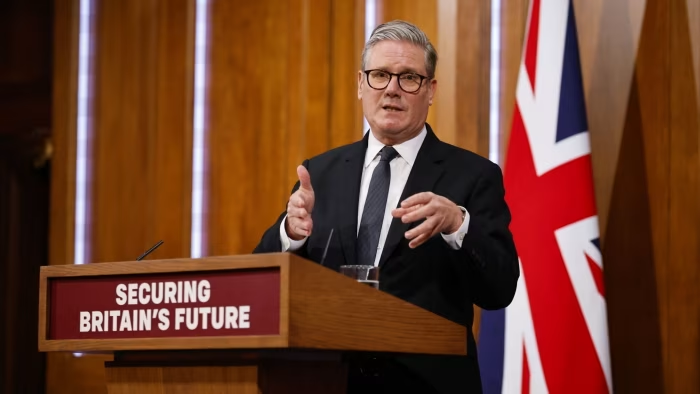United Kingdom Prime Minister Keir Starmer has unveiled sweeping reforms that will force asylum seekers in the UK to navigate longer routes toward permanent residency.
Starmer disclosed that his administration is working towards scrapping automatic settlement rights and family reunions for asylum seekers.
The changes, announced at the European Political Community summit in Copenhagen, aim to dismantle the so-called “golden ticket” for refugees, extending the path to indefinite leave to remain (ILR) from five years to a decade or more, while imposing stricter contribution-based criteria.
Starmer also explained that the overhaul comes amid record-breaking Channel crossings, with over 33,000 migrants arriving by small boats in 2025 alone—a 20% surge from last year.
The UK Prime Minister, speaking to European leaders, said under the new policy asylum seekers in the UK will have to “earn the right to stay rather than rewarding perilous journeys orchestrated by people smugglers.”
“Settlement must be earned by contributing to our country, not by paying a people smuggler to cross the Channel in a boat,” he declared.
He also disclosed that under the new framework, successful asylum seekers in the UK will receive temporary protection status for an initial five-year period, after which they must demonstrate sustained economic contributions.
Starmer said asylum seekers will have to provide proof of employment, tax payments, or community integration to qualify for ILR.
He said: “We need to look again at the interpretation of some of these provisions and we have already begun to do that work in some of our domestic legislation.”
He said the review concerns articles 3 and 8 of the ECHR concerning “cruel and inhumane treatment” in an asylum seeker’s home country and the “right to a family life”.
“All international instruments have to be applied in circumstances as they are now,” the prime minister said. “We are seeing mass migration in a way we have not seen in previous years. Those genuinely fleeing persecution should be afforded asylum. That is a compassionate act, but we need to look again at the interpretation of some of those provisions – not tear them down but look at the interpretation.”
He also announced that the new immigration shift from automatic pathways to a merit-based system is projected to reduce net migration by up to 100,000 annually, per government estimates, by addressing “pull factors” that incentivize irregular arrivals.
“Family reunions, previously granted to over 20,000 spouses, partners, and dependent children last year, will now require proof of financial stability and housing adequacy, potentially delaying or denying joins for thousands,” he added.
Pan-Atlantic Kompass reports that this comes after Home Secretary Shabana Mahmood set out her plans to make it similarly harder for other categories of migrants to qualify for indefinite leave to remain.
Mahmood said asylum seekers in the UK will now have to learn English to a high standard, have a clean criminal record, and volunteer in their community to be granted permanent settlement status.
Details of the new conditions refugees will have to meet to settle in the UK and be accompanied by family members will be set out later in the autumn.
Also, the UK’s Migration Minister Mike Tapp said the changes would stop migrants from being able to “shop around for asylum”.
Tapp told the press that asylum seekers had been “looking for the most generous, almost soft touch” system.
“We’re saying we’re not a soft touch – we’re fair but we’re firm,” he added.
Asylum applications would still be decided on a “case by case” basis, but scrapping the automatic rights to family reunion and settlement would bring the UK “into line” with the rest of Europe, Tapp argued.
Tapp also said the number of people returned to France under the “one in, one out” deal secured in July has risen to seven. A family of three was the first to arrive in the UK under the scheme last week.





